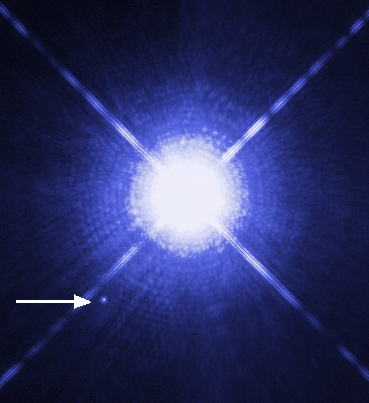Colloquium – Mukremin Kilic – A Revolution in Stellar Astrophysics, and the Remaining Challenges
227 Gallalee Hall 514 University Blvd., Tuscaloosa, AL, United StatesDr. Mukremin Kilic will speak on "A Revolution in Stellar Astrophysics, and the Remaining Challenges"
Colloquium – Shaozhi Li – Phonon Controlled Quantum Phenomena in Correlated Materials
Gallallee Hall Room 227 Gallalee Hall, Tuscaloosa, AL, United StatesSpeaker: Shaozhi Li (Clemson University) Title: Phonon Controlled Quantum Phenomena in Correlated Materials Abstract: In quantum materials, millions of electrons and ions interact with each other, generating diverse quantum phenomena. Today, it remains a significant challenge in simulating such complex microscopic interactions. In this talk, I will discuss the great potential of AI techniques in
Colloquium – Steven Ehkert – 25 Years of the Chandra X-ray Observatory
Gallallee Hall Room 227 Gallalee Hall, Tuscaloosa, AL, United StatesSpeaker: Steven Ehkert (NASA Marshall Space Flight Center) Title: 25 Years of the Chandra X-ray Observatory Abstract: The Chandra X-ray Observatory, launched on July 23rd 1999, has revolutionized our understanding of high energy astronomical phenomena and objects. As we approach 25 years of operations for NASA’s flagship X-ray observatory, we will look back on some
Colloquium – Man Leong Chan – AI in gravitational wave astronomy: successes and challenges
Gallallee Hall Room 227 Gallalee Hall, Tuscaloosa, AL, United StatesSpeaker: Man Leong (Mervyn) Chan (University of British Columbia) Title: AI in gravitational wave astronomy: successes and challenges Abstract: The LIGO-Virgo-KAGRA collaboration has achieved ground-breaking success in detecting over 100 gravitational waves from compact binary coalescences. The observation of GW170817, a binary neutron star merger, has marked the onset of an exciting era of multi-messenger
Colloquium – Vinicius Mikuni – Accelerating Discovery in High Energy Physics using AI
Gallallee Hall Room 227 Gallalee Hall, Tuscaloosa, AL, United StatesSpeaker: Vinicius Mikuni (Lawrence Berkeley National Laboratory) Title: Accelerating Discovery in High Energy Physics using AI Abstract: The past decade was marked by an exponential increase in the availability of experimental data in high energy physics, leading to unprecedented precision in the description of particle interactions. However, indirect evidence for new physics processes, such as
Colloquium – Taoli Cheng – Towards AI-assisted High Energy Physics: A New Paradigm of Understanding Elementary Particles
Gallallee Hall Room 227 Gallalee Hall, Tuscaloosa, AL, United StatesSpeaker: Taoli Cheng (University of Montreal) Title: Towards AI-assisted High Energy Physics: A New Paradigm of Understanding Elementary Particles Abstract: The rapid evolution of artificial intelligence (AI) and deep learning methodologies is driving a profound paradigm shift in scientific discovery. Armed with large-scale datasets and the ability to handle high dimensionality, deep neural networks offer
Theory Seminar by Prof. Dr. Anatoly Dymarsky (Kentucky)
Speaker: Prof. Dr. Anatoly Dymarsky (University of Kentucky) Title: KdV ETH in 2d CFT at finite c Abstract: 2d conformal field theories in full generality admit an infinite tower of conserved charges, the so-called quantum KdV charges, which make the dynamics of stress-energy tensor integrable. An attempt to formulate Eigenstate Thermalization Hypothesis necessarily requires taking
Colloquium – James Camparo – Basic Physics and Atomic Timekeeping in Space
227 Gallalee Hall 514 University Blvd., Tuscaloosa, AL, United StatesSpeaker: Dr. James Camparo (The Aerospace Corp.) Title: Basic Physics and Atomic Timekeeping in Space Abstract: In 1945, during the Richtmeyer Memorial Lecture at the annual meeting of the American Physical Society in New York City, Nobel Laureate I. I. Rabi made the first suggestion for a clock based on
Theory Seminar by Seminar by Prof. Dr. Brian Swingle (Brandeis University)
Gallalee Hall Room 328Prof. Dr. Swingle from Brandeis University will discuss cosmology from random entanglement.
Seminar by Dr. Ruchi Chudasama (UA)
Speaker: Dr. Ruchi Chudasama (UA) Title: Search for axion-like particles in pp and PbPb collisions at the LHC Abstract: This talk delves into the pursuit of the direct production of pseudoscalar axion-like particles (ALPs) decaying to photons, conducted with the data collected by the CMS detectors at the Large Hadron Collider (LHC). ALPs are hypothetical
